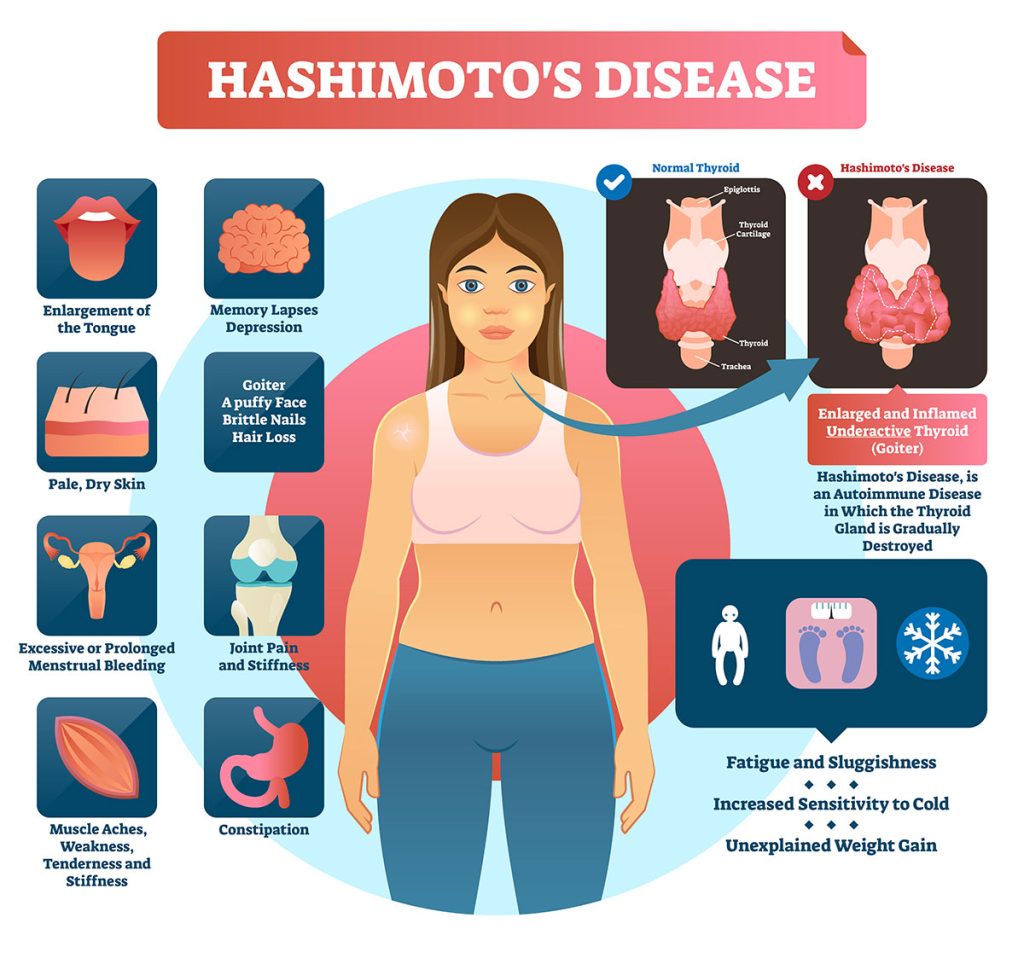Hashimoto’s Disease, also called Hashimoto’s Thyroiditis, occurs when the immune system turns against the body’s own tissues. The immune system directly attacks the thyroid. This then leads to hypothyroidism, which is when the thyroid isn’t making the necessary hormones for proper body functioning. The thyroid plays a leading role in our body, as it is the controller of our metabolism. Without the right hormones, how quickly our body uses calories from what we eat, can be greatly impacted. It is the most common thyroid disorder, affecting 14 million people in the United States.

Symptoms of Hashimoto’s include having an enlarged thyroid. The front of the neck (where the thyroid is located) looks swollen. Symptoms associated with an underactive thyroid, due to the lack of hormone production, include fatigue, weight gain, cold body temperature, hair thinning and loss, depression, irregular menstrual cycles for women, and joint and muscle pain.
The exact cause is not known. There is a strong genetic component. Hormones play a major role, especially since Hashimoto’s is seven times more common in woman than men. Its primary target is middle-aged women. Many women experience thyroid problems after childbirth and about 20% of these women develop Hashimoto’s later on. Certain medications with high levels of iodine can cause this problem. Radiation exposure also can lead to thyroid troubles. In fact, the atomic bombs of Japan lead to this disease in many people. Then, this can be passed on genetically.
Unfortunately, there is no cure for Hashimoto’s. The medical community is not sure what causes autoimmune disorders. Getting medical help is important in order to prevent the progression of the disease. If left untreated women can experience problems with fertility and the risk of high cholesterol increases.
There are some self-care, natural approaches to try to improve or prevent this condition, including your diet. Making sure your diet consists of enough selenium, zinc, vitamin D and iron. Foods to include would be red meat, poultry, beans and dark vegetables. If you do not eat meat, do understand that plant sources are not as absorbable, but taking vitamin C can help with this. Foods you should minimize and eliminate include those that cause inflammation. These include gluten, sugar, artificial sweeteners, soy and dairy. Gut health is critical so making digestion as clean and easy as possible is important. Avoiding toxins can help too, such as plastics, beauty products, air fresheners or candles. Keep your air clean.
Exercise can also be beneficial for Hashimoto’s because it helps lower inflammation and stabilizes the functioning of the immune system. This is because exercise stimulates regulatory T cells which are big inflammation fighters. Also in the process, exercise can balance the pro-inflammatory Th1 system and the anti-inflammatory Th2 system to be less inflammatory. Exercise also helps to release immune cells called IL-6, which lessen inflammation. Just going for walks is a great start but depending on how the person feels, even high-intensity-interval-training (HIIT) can boost workouts and help manage Hashimoto’s. Exercise tolerance is a case-by-case situation and overdoing exercise will only worsen inflammation.

For those I have trained with this condition, we sometimes have to do a trial-and-error approach to ensure the person is doing what their body permits without causing a flare up. It has been my job to scale back intense workouts but still give the client the encouragement and motivation that inspires them to keep exercise as a lifestyle change to support living with Hashimoto’s as best as possible. Many times clients avoid movement thinking their condition prevents them for doing certain types of exercise so why try at all. Movement is medicine so if it’s just walking, it is doing the body good versus being sedentary and lethargic.
Thyroid disease is becoming a major problem. Nearly 20 million Americans have some form of the disease. Diagnosis isn’t always clear at first, but we know when we don’t feel right. Don’t give the thyroid any more power than it already has. Hormones might be tyrant rulers, but we can control our actions and attitude towards feeling our best. Autoimmune diseases are unpredictable. The thyroid greatly influences our metabolism, so our weight is readily affected by its functioning. Although our genetic makeup can leave us powerless, we do have the ability to control our response, adherence to medical help and ability to keep a positive outlook despite medical situations.
Dr. Megan Johnson McCullough, owner of Every BODY’s Fit in Oceanside CA, is a NASM Master Trainer, AFAA group exercise instructor, and specializes in Fitness Nutrition, Weight Management, Senior Fitness, Corrective Exercise, and Drug and Alcohol Recovery. She’s also a Wellness Coach, holds an M.A. Physical Education & Health and a Ph.D in Health and Human Performance. She is a professional natural bodybuilder, fitness model, and published author.
References
